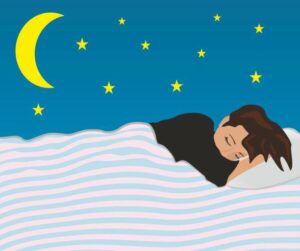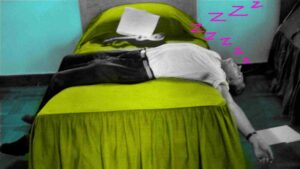Do you suffer from low back pain? If so, your low back pain might be because of a wrong sleeping position. Believe it or not, the way you sleep can have a huge impact on your back health. In this blog post, we will discuss some of the best and worst sleeping positions for people with low back pain. We will also provide tips on adjusting your sleep habits to improve your back health!
Contents
How Should I Sleep To Relieve Lower Back Pain?
 It’s a common question and one that doesn’t have a straightforward answer.
It’s a common question and one that doesn’t have a straightforward answer.
Most people would assume that the best way to sleep is on your back, but this can actually aggravate lower back pain. The reason is that when you lie flat on your back, the weight of your body presses down on the mattress, and this can put a strain on your back.
The best way to sleep is actually on your side, with a pillow between your legs. This takes the pressure off your back and will help to keep it in alignment. If you find it difficult to stay on your side, you can try sleeping with a pillow under your knees. This will help to keep your back in a neutral position.
If you’re a stomach sleeper, it’s best to try and break this habit. Sleeping on your stomach can cause misalignment in your spine and put a strain on your lower back. If you can’t switch to sleeping on your side or back, then place a pillow under your pelvis and lower abdomen. This will help to take the pressure off your back.
Reasons For Having A Low Back Pain While Sleeping
Most people assume that the pain in their backs is just from poor posture or sitting in an awkward position for too long. However, this isn’t always the case. Many times, the pain can be attributed to sleeping in the wrong position.
If you find that you’re waking up with a sore back, it’s worth considering whether your sleeping position could be to blame. Here are some of the most common reasons why you might experience low back pain while sleeping:
You’re Sleeping On Your Stomach

If you sleep on your stomach, you’re likely putting a lot of strain on your back. This is because you’re effectively forcing your spine into an unnatural position. Over time, this can lead to pain and stiffness.
If you’re a stomach sleeper, the best way to reduce your risk of back pain is to use a pillow beneath your pelvis. This will help keep your spine in a neutral position and take some of the strain off of your back.
You’re Sleeping On Your Back
Sleeping on your back is generally considered to be the best position for your spine. This is because it keeps your spine in a neutral position and doesn’t put any extra strain on your back.
However, if you don’t have proper support while sleeping on your back, it can actually lead to more pain. This is because your spine can start to sag in the middle, which puts pressure on the disks in your back.
To avoid this, be sure to use a pillow beneath your knees. This will help keep your spine in alignment and reduce the amount of pressure on your back.
You’re Sleeping On Your Side
Sleeping on your side is another good position for your spine. However, if you don’t have proper support, it can actually lead to pain.
This is because when you sleep on your side, your top leg tends to fall forward. This can put pressure on your hip and lead to pain in your lower back.
You’re Sleeping In An Awkward Position

If you find yourself sleeping in an awkward position, it’s likely that you’re putting extra strain on your back. This can lead to pain and stiffness.
To avoid this, it’s important to find a comfortable position that doesn’t put any extra strain on your back. If you’re not sure what position is best for you, it’s worth talking to a doctor or physiotherapist.
You Have Poor Sleep Posture
Poor sleep posture is one of the most common causes of low back pain. This is because when you sleep, your spine is in a relaxed state. As a result, it’s more susceptible to poor alignment.
To avoid this, it’s important to maintain good sleep posture. This means sleeping on your side or on your back with a pillow beneath your knees. It’s also important to avoid sleeping on your stomach, as this can put extra strain on your back.
Tips For Treating Lower Back Pain
If you are having trouble sleeping and you’re waking up to shooting pain in your lower back, you might be sleeping in the wrong position. People often don’t realize that the way they sleep can actually aggravate their back pain, making it worse when they wake up.
There are a few tips you can follow to make sure you’re not making your back pain worse when you sleep:
Find the right position
Different people have different preferences for how they like to sleep. Some people like to sleep on their sides, some on their stomachs, and some on their backs. If you’re not sure what position is best for you, experiment a little bit and see what feels most comfortable.
Use a pillow
A pillow can help support your neck and head, which takes the pressure off your back. If you’re a side sleeper, put a pillow between your knees to keep your spine in alignment. If you’re a stomach sleeper, put a pillow under your pelvis to prevent arching your back.
Use memory foam mattress

Memory foam mattresses are designed to contour your body, providing support and alleviating pressure points. This can be helpful if you have back pain, as it can help reduce the amount of stress on your spine. If you’re suffering from lower back pain, following these tips can help you find relief and sleep more comfortably.
Exercise regularly
Staying active is important for your overall health, but it can also help reduce and prevent back pain. Exercise strengthens the muscles in your back and abdomen, which support your spine. It also helps improve flexibility and range of motion, making it less likely to be injured. Regular exercise can also help you maintain a healthy weight, which further reduces your risk of back pain.
Stretch before bed
Stretching before bed can help relax your muscles and prevent them from tightening up overnight. This can lead to less pain when you wake up in the morning. Try doing some gentle back stretches before you go to sleep.
Avoid high-impact activities
If you have back pain, you should avoid activities that jar or jolt your back, such as running or contact sports. These activities can aggravate your pain and make it worse. Instead, stick to low-impact activities, such as walking, swimming, or cycling.
Wear supportive shoes
Wearing shoes with good arch support can help reduce the stress on your back. If you’re on your feet a lot during the day, make sure to wear comfortable, supportive shoes.
Medication
If your back pain is severe, you may need to take medication to help relieve the pain. Over-the-counter medications, such as ibuprofen or acetaminophen, can be helpful. You can also talk to your doctor about prescription pain medication if your pain is severe.
Physical therapy

If your back pain is chronic, you may need to see a physical therapist. Physical therapy can help improve your flexibility and range of motion, as well as strengthen the muscles in your back. Surgery. In some cases, surgery may be necessary to treat back pain. This is usually only recommended if other treatments have not been effective.
Surgery
In some cases, surgery may be necessary to relieve back pain. This is usually only recommended if other treatments haven’t been successful.
Following these tips can help you find relief from lower back pain and sleep more comfortably. Different people will find different positions and exercises helpful, so it’s important to experiment to see what works best for you.
Conclusion
Low back pain sleeping position can vary depending on the person and the severity of their pain. Some people may find relief by sleeping on their stomachs, while others may need to sleep on their backs or sides. Speak with your doctor or a physical therapist to determine the best sleeping position for your low back pain.
Physical Therapy help patients recover from pain. If you’re experiencing Back pain, Shoulder pain, Knee pain, Neck pain, Elbow pain, Hip pain, or Arthritis pain, a physical therapist at MantraCare can help: Book a physiotherapy session.


